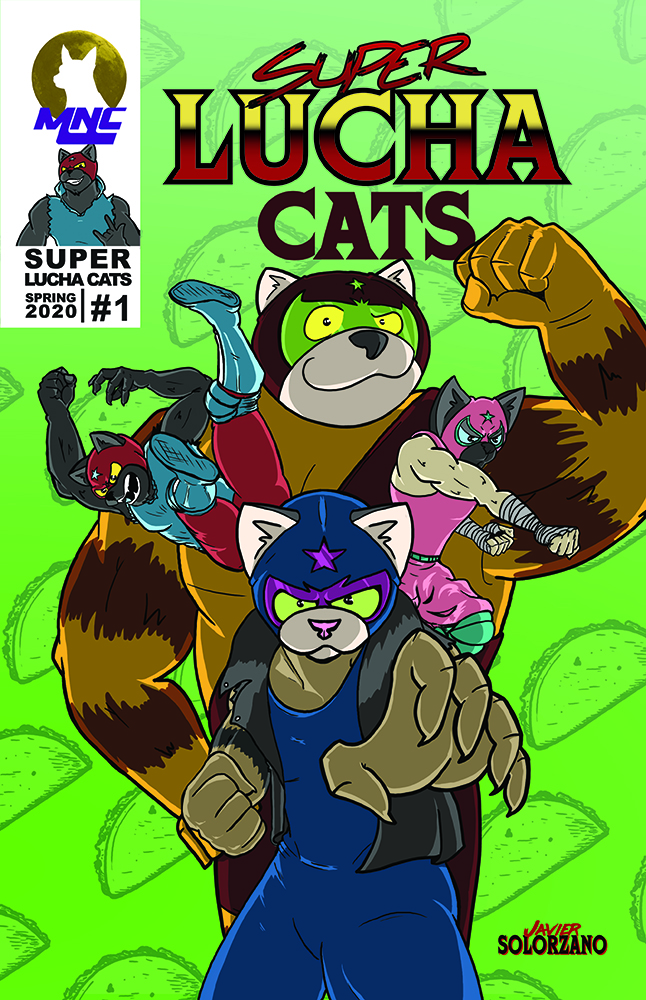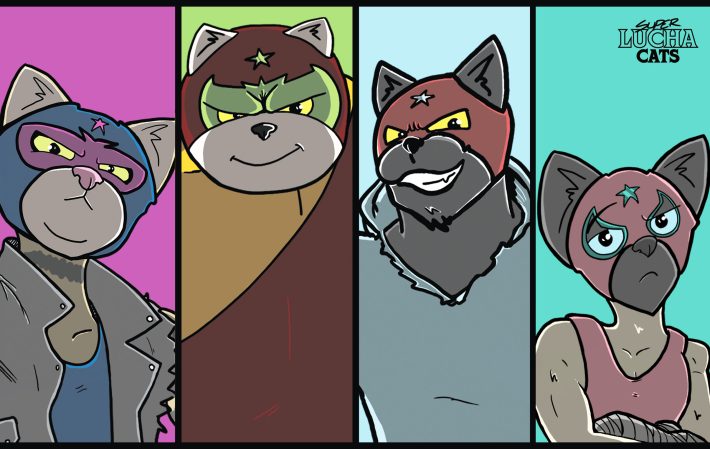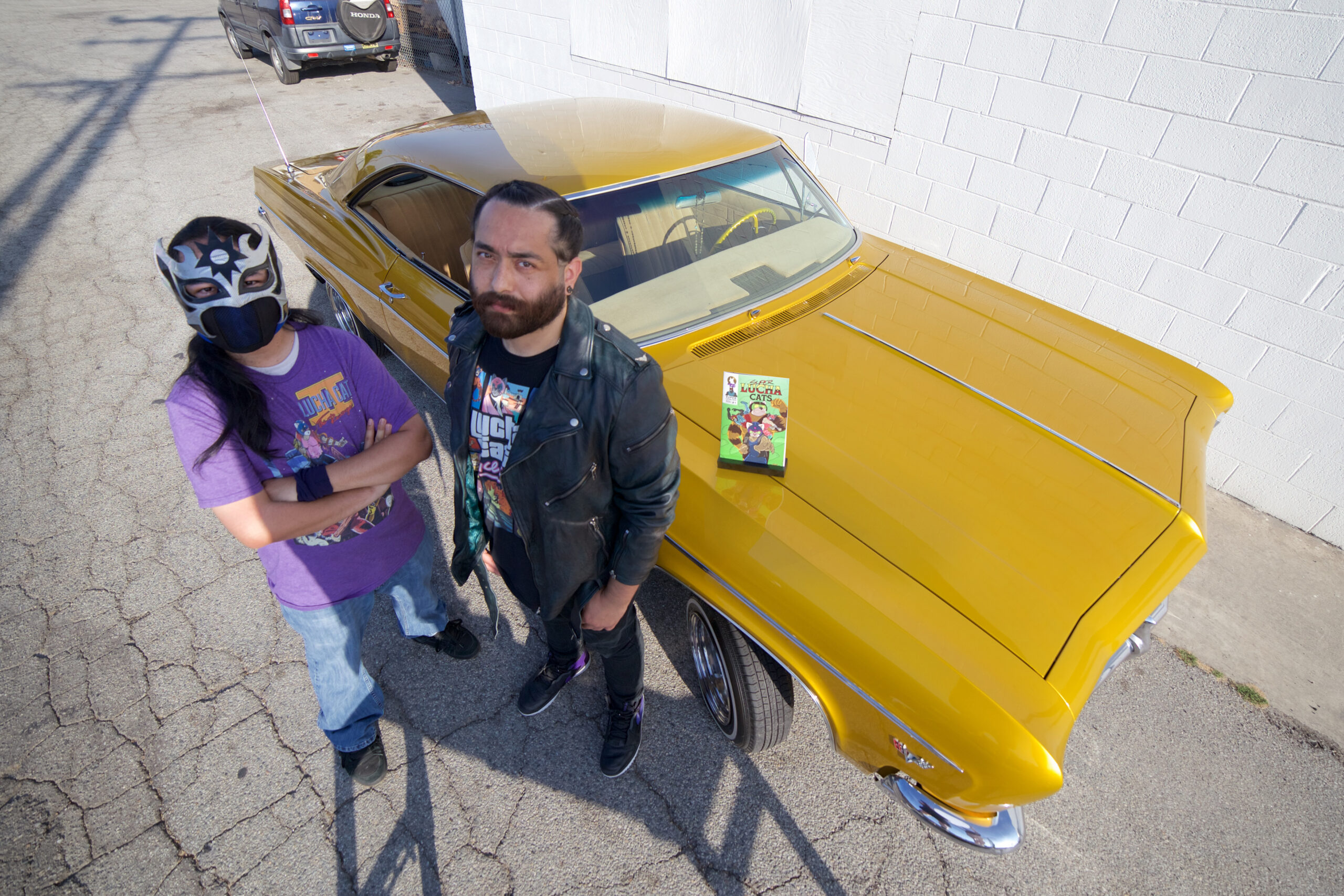[dropcap size=big]X[/dropcap]-Men: The Animated Series meets Teenage Mutant Ninja Turtles, but with cats, a Latinx upbringing in SELA (Southeast Los Angeles), and fueled by 90s nostalgia from a childhood spent watching cartoons on Saturday mornings.
Those are the kind of vibes that the Bell Gardens-raised artist Javier Solórzano is tapping into in his comic book, Super Lucha Cats.
The story follows a family of anthropomorphic cats trained to be wrestlers by their adoptive Mom, a retired world champion. Together, they protect the city of Bell Gardens from monsters while eating tacos because that’s what heroes do. Eat tacos. But beneath flying elbow drops and tacos, Javier tells a story that centers on family, traditions and his love for Lucha Libre. “I want to show that a family can be non-traditional and still loved. That we can create a family through community, care, love, and punching evil in the mouth together when necessary.”

When reading the book, it seems like Javier had no trouble melding multiple genres together to tell this story, but he credits his editor, Mark Batalla, for helping to shape the overall story and for giving him the feedback he needed to hear. The book is a passion project for Javier, and this was his first time working with an editor, which made accepting the edits tough in the beginning, but it pushed him to be a stronger writer.
Also read: ‘How to Fold a Taco:’ Meet the First L.A. Born-and-Raised Latina to Write a Taco Children’s Book
Born and raised in Bell Gardens and with roots in Durango and Jalisco, Javier made his community the book’s setting out of hometown pride and challenged the community’s stereotypes and perceptions. He explains that whenever Bell Gardens is talked about in the news, the narrative is about corrupt politicians or gang violence in the community. As a student at UC Santa Barbara, he would always have to go out of his way to explain to people where Bell Gardens was in relation to the L.A. metro area. As exhausting as that was, during a class lecture, he realized just how deep the stigmatization of southeast L.A. goes.
“The Latinx experience in SELA is more than just gangbangers,” explains Javier.
He remembers one of his professors tearing into the Citadel Outlets in Commerce during a lecture. “My head perked up as soon as he started talking about Citadel. He then describes the city as a really dirty area and says, ‘I’m sorry if anyone is from there, but there’s nothing there.’ He described it to students from the midwest who moved out to California for college, who are now being told that [SELA] is a dirty place full of gang violence and consumerism. That just always stuck with me,” says Javier.

These experiences also led him to write a story that didn’t perpetuate the stereotype that cholos are evil and need to be locked away. “Cholos have sort of become this chic thing online, and I remember growing [up] and being really scared of them. I saw my friend’s brother murdered in front of their house as a teenager.” It’s that kind of trauma and personal experience that lead to a conversation with his editor to stay away from that trope. “We aren’t going to fight cholos and drug dealers. I don’t want to retell that story. We have enough of that. The Latinx experience in SELA is more than just gangbangers,” explains Javier. “If we can divorce that narrative from this area, we can highlight a lot of the cool shit there.”
“We got some work to do in showing how cool, and interesting [our] communities can be.”
Once the book was finished, Javier initially planned to promote the book this summer at comic book conventions and independent wrestling shows throughout L.A., but the pandemic changed everything. The printer he was working with closed briefly at the beginning of the pandemic, delaying the book’s release.
Like many of us, Javier transitioned his new work from home life as a graphic designer and shifted to promoting the comic online. He created motion videos of the comic for social media and a music video with friends’ support. He’s currently working on issue two of Super Lucha Cats and is optimistic about promoting the book in person like he originally intended in the near future.
“We got some work to do in showing how cool, and interesting [our] communities can be.”
You can purchase a copy of Super Lucha Cats and other merch on his Etsy store.







